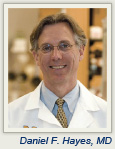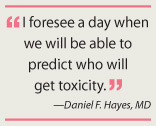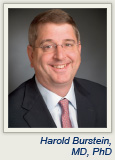 According to Daniel F. Hayes, MD, of the University of Michigan, Ann Arbor, who moderated the Best of ASCO® Miami conference, taxane-induced neuropathy is a more complicated story than the study by Schneider and colleagues may suggest.
According to Daniel F. Hayes, MD, of the University of Michigan, Ann Arbor, who moderated the Best of ASCO® Miami conference, taxane-induced neuropathy is a more complicated story than the study by Schneider and colleagues may suggest.
“There are now three observations regarding inherited germline single-nucleotide polymorphisms (SNPs) and the risk of taxane-induced neuropathy, each using samples from North American breast cancer group trials and each completely different,” he told The ASCO Post. In addition to Schneider’s trial based on E5103, tissue samples from SWOG S0221 and CALGB 40101 also  demonstrate significant—though disparate—genetic associations. The investigators from these three studies are now collaborating in an effort to validate one or more of these variants. “Each investigator has made observations in one dataset, and they will now take that data and apply it to the other datasets,” Dr. Hayes said.
demonstrate significant—though disparate—genetic associations. The investigators from these three studies are now collaborating in an effort to validate one or more of these variants. “Each investigator has made observations in one dataset, and they will now take that data and apply it to the other datasets,” Dr. Hayes said.
“Right now, I would not use any of the data to withhold taxanes, but I foresee a day when we will be able to predict who will get toxicity,” he said. “We will then be able to determine who should perhaps not receive a taxane in spite of its benefit, or should get one taxane vs the other.” ■

 Dr. Harold Burstein: The risk of developing breast cancer was 2.5% in the placebo arm, vs 1% to 1.5% risk with exemestane. Also, the cancers that were avoided were probably ones with good...
Dr. Harold Burstein: The risk of developing breast cancer was 2.5% in the placebo arm, vs 1% to 1.5% risk with exemestane. Also, the cancers that were avoided were probably ones with good...